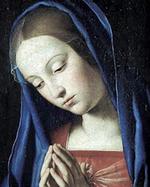Catholic Activity: We Are Kings
Just as there is a special priesthood and a lay priesthood, so also is there a special kingship and a lay or common kingship in the Church. Christ is both Priest and King; and He permits His Mystical Body, the Church, to have a share in these two offices. Every Christian, therefore, is a king. St. Peter wrote to his followers: "You are a chosen generation, a kingly priesthood" (1 Pet. 2:9). In the Apocalypse the ancients sing before the Lamb: "You have made them (the redeemed) priests and kings unto our God, and they will reign upon the earth" (Apoc. 5:10). The Christian becomes a king at baptism when he is anointed with chrism.
DIRECTIONS
How can we practice our royal prerogatives? We must distinguish the two great epochs of our lives, that here on earth and that hereafter in heaven. In the present life our kingship is hidden, veiled, even as Christ's kingship on earth was little manifest. In chains before Pilate, He nevertheless acknowledged: "I am a king . . . My kingdom is not of this world" (John 18:3637). Our Christian kingship, accordingly, is not of this world and does not consist in tangible power, in riches, honors. It is a kingdom of the spirit. Nevertheless it is real.
Now every king has a kingdom; he must rule, must battle against enemies, must conquer, must exercise the office of arbiter and supreme judge. All of which holds true of the Christian. His kingdom is the realm of God which he establishes in his soul, for which he cares, which he develops and stabilizes. It is a kingdom that begins at baptism and requires a whole lifetime for expansion and development. Here human and divine energies work hand in hand. As king over this realm his duties are three: to rule, to conquer, and to judge.
To rule. In the soul's citadel the Christian must reign supreme. For this he needs a strong will. He rules through suffering, he rules through patience, he rules through obedience, he rules through love. Of this rule and its contrary, Christ said: "The truth shall make you free . . . whoever commits sin is the slave of sin" (John 8:32, 34). A Christian's ruling power consists, then, in remaining free from the slavery of sin.
To conquer. Ruling is not unrelated to fighting. The Christian must be a soldier, a conqueror. In the seven letters written to the angels of the seven Churches, there reoccurs in stereotype fashion the admonition: "He who conquers . .. to him who overcomes.
Lastly, the Christian must be a judge. He judges well if he always decides in favor of the good and against the bad. Thus we are kings, kings over a spiritual, an invisible kingdom. But hereafter our kingdom will become openly manifest; then we will rule with Christ, we will "judge the angels" (1 Cor. 6:3). Christ promised to those who renounced earthly ties for His sake: "You who have followed Me, in the regeneration when the Son of Man will sit on the throne of His glory, you also will sit on twelve thrones judging the twelve tribes of Israel" (Matt. 19:28). The details of our roles as kings in the heavenly kingdom we can at present only surmise.
Activity Source: Church's Year of Grace, Volumes 1-5 by Dr. Pius Parsch, The Liturgical Press, Collegeville, Minnesota, 1964






